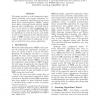17 search results - page 1 / 4 » A Comparison between Supervised Learning Algorithms for Word... |
CORR
2000
Springer
13 years 4 months ago
2000
Springer
This paper describes a set of comparative experiments, including cross{corpus evaluation, between ve alternative algorithms for supervised Word Sense Disambiguation (WSD), namely ...
ECAI
2000
Springer
13 years 8 months ago
2000
Springer
Abstract. This paper describes an experimental comparison between two standard supervised learning methods, namely Naive Bayes and Exemplar–basedclassification, on the Word Sens...
NLP
2000
13 years 7 months ago
2000
In this article we compare the performance of various machine learning algorithms on the task of constructing word-sense disambiguation rules from data. The distinguishing characte...
ACL
2004
13 years 5 months ago
2004
Supervised learning methods for WSD yield better performance than unsupervised methods. Yet the availability of clean training data for the former is still a severe challenge. In ...
ACL
2003
13 years 5 months ago
2003
We present a supervised machine learning algorithm for metonymy resolution, which exploits the similarity between examples of conventional metonymy. We show that syntactic head-mo...

